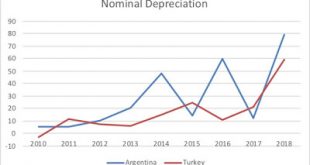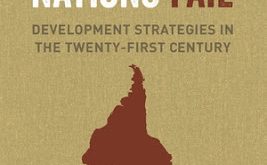This seminar series focuses on the analysis of Economic Development in the XXIst century. The notions of distribution, industrial policy and balance of payments constraints will be profoundly analyzed during these four sessions. As there is much disagreement about what drives economic development - and at the same time it is a central objective for developing economies - this question merits deep reflection. Through these seminars there will be a particular focus on the external...
Read More »International Confederation of Associations for Pluralism in Economics (ICAPE) Call for Papers
From Geoff Schneider ICAPE's Executive Director: Proposals for papers, workshops and panels at ICAPE are due Tuesday, September 4th. I hope you can join us for this conference that brings together all of the heterodox perspectives.Information below. International Confederation of Associations for Pluralism in Economics (ICAPE) Call for Papers, Panels and Workshops Agnes Scott College, Atlanta, GA January 3, 2019, 7:00 AM to 5:00 PM Gender, Race, Class and Crises:...
Read More »Income distribution and the balance of payments: a formal reconstruction of some Argentinian structuralist contributions
A two part paper by Ariel Dvoskin and Germán David Feldman. From the abstract:In this two-part paper, we explore the interaction between income distribution and the balance of payments, by assessing the contributions of three Argentinian exponents of the Latin American Structuralist School: Oscar Braun, Marcelo Diamand and Adolfo Canitrot. With this aim, we introduce a two-sector model inspired by the classical tradition. Part I of the article examines the implications for prices and...
Read More »Distribution and Conflict Inflation in Brazil under Inflation Targeting
I can't watch this either For those interested in the Brazilian situation I highly recommend the recently published paper by Franklin Serrano and Ricardo Summa (Review of Radical Political Economics page here). From the abstract: In this paper, we analyze Brazilian inflation under the inflation-targeting system from a conflict inflation perspective and show how the inflation target system only worked well when there was a trend of exchange rate appreciation. Later, the strengthening of...
Read More »A Tale of Two Currency Crises: A Short Comment
So the Turkish foreign exchange crisis is all over the news. But the Argentine one is less conspicuous in the international media. Turkey's economy has had many similarities with Latin American economies over the years, in terms of the incomplete process of industrialization, and the types of crises associated with neoliberal reforms over the last three decades. Note, however, that the Argentine nominal depreciation has been larger than the Turkish (the same is true if you go back to the...
Read More »Nancy MacLean on constitutional economics and the conservative movement
[embedded content] Author of a great book on James Buchanan, that is certainly worth reading. The whole thing is related to Buchanan's constitutional economics and how it underpins the Koch's strategy to take over the country (and Pence is their guy, btw). The American Legislative Exchange Council (ALEC) that has been so influential in the far- right conservative movement take over of US politics at the State and local level (see this old piece in The Atlantic, or this in The Nation) has a...
Read More »Institutions and Economic Development in Latin America
Almost a decade ago, The Economist had a cover story about the Brazilian economy taking off. Everything seemed fine, with the Brazilian economy on the verge of surpassing Britain and France, and on its way to economic development. Among the reasons given for the Brazilian success was the fact that the country had “established some strong political institutions.” But many other factors were cited, like fiscal restraint, an independent central bank, openness to foreign direct investment,...
Read More »Leo Panitch on Obama and Globalization
From the Real News Network: [embedded content] This Real News segment with Professor Leo Panitch is worth watching for those that miss Obama (perhaps should be seen together with the reading of this piece on Mike Pence, for those that think that he would be much better than the orange one). At any rate, besides the fact that Obama was not even for more than a very moderate reform of the system, and that he still justifies globalization in neoliberal terms, it seems to me that Panitch (and...
Read More »Three Globalizations, Not Two: Rethinking the History and Economics of Trade and Globalization
By Thomas Palley (Guest blogger)The conventional wisdom is there have been two globalizations in the modern era. The first began around 1870 and ended in 1914. The second began in 1945 and is still underway. This paper challenges that view and argues there have been three globalizations, not two. The first half of the paper provides empirical evidence for the three globalizations hypothesis. The second half discusses its analytical implications. The Victorian first globalization and...
Read More »Globalization Checkmated? Political and Geopolitical Contradictions Coming Home to Roost
By Thomas Palley (Guest blogger)The deepening of economic globalization appears to have ground to a halt and the process may even unravel a little. The sudden stop has surprised economists, whose belief in globalization has strong parallels with Fukuyama’s (1989) flawed end of history hypothesis. The paper presents a simple analytic model that shows how economic globalization has triggered political and geopolitical contradictions. For the system to work, politics within countries and...
Read More » Naked Keynesianism
Naked Keynesianism





